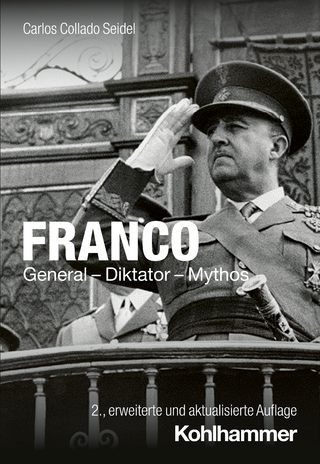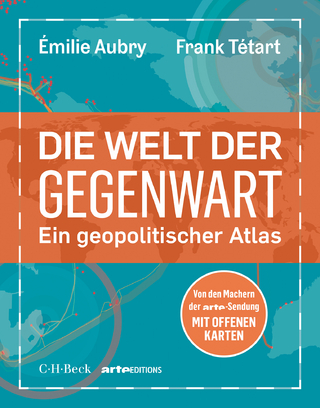
Conflict After the Cold War
Routledge (Verlag)
978-1-032-01009-0 (ISBN)
Edited by one of the most renowned scholars in the field, Richard K. Betts’s Conflict After the Cold War assembles classic and contemporary readings on enduring problems of international security. Offering broad historical and philosophical breadth, the carefully chosen and excerpted selections in this popular reader help students engage in key debates over the future of war and the new forms that violent conflict will take. Conflict After the Cold War encourages closer scrutiny of the political, economic, social, and military factors that drive war and peace.
New to the Sixth Edition
Eight new readings covering issues that have grown in salience since the previous edition or that present new interpretations of answers to old problems, including pieces by Robert Kagan, Edward O. Wilson, Scott D. Sagan, Robert Jervis and Jason Healey, Jacqueline L. Hazelton, Oystein Tunsjo, and Michael Beckley.
Updated volume and chapter introductions and a new reading by Richard K. Betts.
Richard K. Betts is Leo A. Shifrin Professor of War and Peace Studies in the Department of Political Science and School of International and Public Affairs at Columbia University, Adjunct Senior Fellow at the Council on Foreign Relations, and author of American Force, Enemies of Intelligence, Military Readiness, Surprise Attack, and other books.
Preface
PART I Visions of Conflict and Peace
1.1 The End of History?
Francis Fukuyama
1.2 Why We Will Soon Miss the Cold War
John J. Mearsheimer
1.3 The Clash of Civilizations?
Samuel P. Huntington
1.4 The Strongmen Strike Back
Robert Kagan
PART II International Realism: Anarchy and Power
2.1 The Melian Dialogue
Thucydides
2.2 Doing Evil in Order to Do Good
Niccolò Machiavelli
2.3 The State of Nature and the State of War
Thomas Hobbes
2.4 Realism and Idealism
Edward Hallett Carr
2.5 The Origins of War in Neorealist Theory
Kenneth N. Waltz
2.6 Hegemonic War and International Change
Robert Gilpin
2.7 Power, Culprits, and Arms
Geoffrey Blainey
PART III International Liberalism: Institutions and Cooperation
3.1 Perpetual Peace
Immanuel Kant
3.2 Peace Through Arbitration
Richard Cobden
3.3 Community of Power vs. Balance of Power
Woodrow Wilson
3.4 Liberalism and World Politics
Michael W. Doyle
3.5 Power and Interdependence
Robert O. Keohane and Joseph S. Nye
3.6 The Obsolescence of Major War
John Mueller
PART IV Psychology and Culture: The Human Mind, Norms, and Learning
4.1 Why War?
Sigmund Freud
4.2 How Good People Do Bad Things
Stanley Milgram
4.3 War and Misperception
Robert Jervis
4.4 Spirit, Standing, and Honor
Richard Ned Lebow
4.5 War Is Only an Invention—Not a Biological Necessity
Margaret Mead
4.6 People Must Have a Tribe
Edward O. Wilson
4.7 Men, Women, and War
J. Ann Tickner
PART V Economics: Interests and Interdependence
5.1 Money Is Not the Sinews of War, Although It Is Generally So Considered
Niccolò Machiavelli
5.2 The Great Illusion
Norman Angelll
5.3 Paradise Is a Bazaar
Geoffrey Blainey
5.4 Imperialism, the Highest Stage of Capitalism
V. I. Lenin
5.6 Imperialism and Capitalism
Joseph Schumpeter
5.7 War as Economic Policy
Alan S. Milward
5.8 Structural Causes and Economic Effects
Kenneth N. Waltz
5.9 Trade and Power
Richard Rosecrance
PART VI Politics: Ideology and Identity
6.1 Democratization and War
Edward D. Mansfield and Jack Snyder
6.2 Nations and Nationalism
Ernest Gellner
6.3 Possible and Impossible Solutions to Ethnic Civil Wars
Chaim Kaufmann
6.4 The Troubled History of Partition
Radha Kumar
PART VII Military Technology, Strategy, and Stability
7.1 Cooperation Under the Security Dilemma
Robert Jervis
7.2 The Offensive/Defensive Balance of Military Technology
Jack S. Levy
7.3 Why Nuclear Proliferation May Be Good
Kenneth N. Waltz
7.4 Why Waltz Is Wrong
Scott D. Sagan
7.5 The Dynamics of Cyber Conflict
Robert Jervis and Jason Healey
7.6. Is Strategy an Illusion?
Richard K. Betts
PART VIII Terrorism, Revolution, and Unconventional Warfare
8.1 The Strategic Logic of Terrorism
Martha Crenshaw
8.2 Speech to the American People
Osama bin Ladin
8.3 Science of Guerrilla Warfare
T. E. Lawrence
8.4 On Guerrilla Warfare
Mao Tse-Tung
8.5 Patterns of Violence in World Politics
Samuel P. Huntington
8.6 Insurgency and Counterinsurgency
David Galula
8.7 Principles, Imperatives, and Paradoxes of Counterinsurgency
Eliot Cohen, Conrad Crane, Jan Horvath, and John Nagl
8.8 The "Hearts and Minds" Fallacy
Jacqueline L. Hazelton
PART IX Threat Assessment and Misjudgment: Recurrent Dilemmas
9.1 The German Threat? 1907
Eyre Crowe and Thomas Sanderson
9.2 The German Threat? 1938
Neville Henderson
9.3 The Threat to Ukraine From the West
Vladimir Putin
9.4 China: The Return of Bipolarity
Oystein Tunsjo
9.5 China: The Overestimated Threat
Michael Beckley
9.6 How Could Vietnam Happen? An Autopsy
James C. Thomson, Jr
PART X New Threats and Strategies for Peace
10.1 Environmental Changes as Causes of Acute Conflict
Thomas F. Homer-Dixon
10.2 Why Cyberdeterrence Is Different
Martin C. Libicki
10.3 The Dark Side of Progress
Fred C.Iklé
10.4 A World of Liberty Under Law
G. John Ikenberry and Anne-Marie Slaughter
10.5 Peace Among Civilizations?
Samuel P. Huntington
| Erscheinungsdatum | 04.01.2022 |
|---|---|
| Zusatzinfo | 9 Tables, black and white; 6 Line drawings, black and white; 6 Illustrations, black and white |
| Verlagsort | London |
| Sprache | englisch |
| Maße | 152 x 229 mm |
| Gewicht | 453 g |
| Themenwelt | Geschichte ► Allgemeine Geschichte ► Zeitgeschichte |
| Sozialwissenschaften ► Politik / Verwaltung ► Staat / Verwaltung | |
| ISBN-10 | 1-032-01009-6 / 1032010096 |
| ISBN-13 | 978-1-032-01009-0 / 9781032010090 |
| Zustand | Neuware |
| Informationen gemäß Produktsicherheitsverordnung (GPSR) | |
| Haben Sie eine Frage zum Produkt? |
aus dem Bereich


